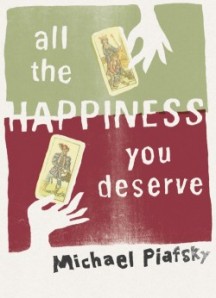Before the leash even comes out of the closet, distract him. Resort to the baby talk you used when he was a puppy, or from the years before you had children. Give him a cookie. Pat his head, tell him what a good little doggy he is, yes he is, yes he is. Who wants to go out? Come on, let’s go out, come on. Hurry down the stairs. It’s key to have him forget it’s raining from the time he’s lying on the living room rug to the time you reach the lobby and he’s faced with the sopping streets. Be ready with your umbrella so you can walk out and open it and head down the stoop as if it’s no big deal that it’s raining, see, dog? No big deal. Now just go to the bathroom. Disregard all the rules you usually try to follow such as: no peeing on trees, or trashcans, or fences, or the steps of people’s houses. During the dry days you’ve trained him to pee in the street, but now, in the rain, as he hunches in upon himself and looks up at you as if each raindrop was spit from your mouth, you let him go wherever he wants. Ignore him, look around, as if you don’t even notice the rain soaking through your shoes and dampening your pants to the knee. Don’t get angry, even when he stops, half-lifts a leg, then pauses, glances up at the rain, back at you, and lowers his leg without peeing. Don’t start to scold him and say things like, “Do you think I care if you have to hold your pee for twelve hours?” Because he knows you care. And by now he’s terribly wounded, wet through, miserable, completely unable to pee. Eventually, you’ll have to give up. There’s no hope of the dog actually peeing. But you might feel better because you tried, you did your part, and, really, it’s his fault now. Back upstairs, give him a cookie after you rub him down, tell him he’s a good dog. Because there’s always the next time, the next rain. Maybe then he’ll learn.
The Empty House
 From the northern wilderness of Alaska to the mountains of Guatemala, from rural Ireland to war-torn Haiti, from the small towns of Montana to the crowded suburbs of New Jersey, the characters in these award-winning stories travel with dreams of escape, but find themselves ensnared by cultural misunderstandings, political strife, and the weight of family. The characters walk the fine line between safety and danger, between good and evil, between life and death, and on their way find their truest selves revealed.
From the northern wilderness of Alaska to the mountains of Guatemala, from rural Ireland to war-torn Haiti, from the small towns of Montana to the crowded suburbs of New Jersey, the characters in these award-winning stories travel with dreams of escape, but find themselves ensnared by cultural misunderstandings, political strife, and the weight of family. The characters walk the fine line between safety and danger, between good and evil, between life and death, and on their way find their truest selves revealed.
Where to find it: Willow Springs Editions
